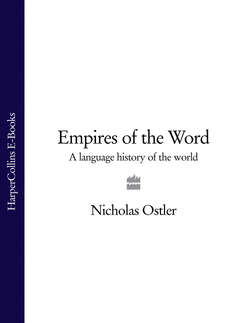Читать книгу Empires of the Word: A Language History of the World - Nicholas Ostler - Страница 9
The state of nature
ОглавлениеLanguages have been the currency of human communities for hundreds of thousands of years, and naturally the typical language community has changed in that time. The presumption is that before the discovery and expansion of agriculture, human communities were small bands, just as the remaining groupings of hunter-gatherers are to this day. These groups all have languages, and ancient lore and stories which the old retail to the young. The density of the human population, wherever people were living, would have been far less than it is today. It is a commonplace of historical linguistics that related languages diverge when contact ceases between groups, so we can also presume that in this early period each self-sufficient community, of up to a few thousand people, would by and large have had its own language.
All this changed in communities that adopted a settled way of life, based on herding and agriculture. Now communities would have become both larger and more organised. In settled communities, one’s neighbours in one year would remain one’s neighbours for many years, indeed generations, to come. One might have dues to pay, and negotiate, with higher authorities. Festivals, and markets, would bring together people from a wide area. Militias would be raised to defend local communities, and to steal from others perceived to be weaker. There began to be a motive for communication among people over longer distances. Bilingualism would have increased in the population, and also languages would have grown in terms of the number of speakers; quite likely, too, the absolute number of languages would have fallen, smaller communities losing speakers through war, marriage or desertion, or simply a pragmatic tendency to use other people’s languages.
From the very nature of the changing situation we could have inferred these processes. But in fact it has been possible to watch them. They have been observed in accelerated development in the last couple of generations in Papua New Guinea, as the old self-sufficient ways of life in villages and hamlets yield to a wider-ranging national way of life. A feature of this transition is the decline of many of the indigenous languages and their replacement through the expansion of neighbouring tongues, or more globally by languages associated with trade at the national level, or government: utility jargons or pidgins are quickly transformed into general-purpose creole languages, informally but effectively standardised across vast numbers of speakers.
